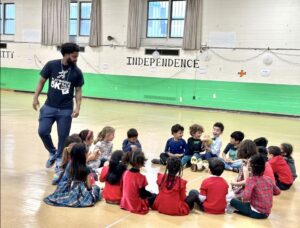Interview: Robin Grossman of Playworks
June 26, 2024It’s Not All Fun and Games….
Between 2010 and 2023, HFNJ awarded eight grants totaling nearly $850,000 to bring the innovative, play-based services of Playworks to schools in Newark. We spoke with Robin Grossman, Executive Director of Playworks New York/New Jersey, about the difference Playworks has made for schools, students, and communities in Newark.

Q) Tell us about Playworks’ model, and how Playworks Onsite Coaches work within schools.
A) Playworks partners with schools to utilize play in a way that promotes a broad range of improved health and academic outcomes. Our coaches are the key to implementing the program. The coaches provide full-time, direct service to students on-site, year-round to implement our play-based programming during and after school. During recess, coaches facilitate inclusive and active games for students to create a structured and safe recess environment. Coaches provide weekly in-class game time for each class, giving students an opportunity to practice healthy play, get active and develop social-emotional skills in a more focused setting.
They serve as gentle guides for kids, showing them how to get in the game, have fun and get along with their peers―moving past the awkward and sometimes intimidating feeling of unhealthy chaos at recess.
Q) Why is this needed? Haven’t schools been providing recess just fine for decades?
A) Unfortunately, youth in many communities do not have equitable access to well-designed and facilitated play time and recess. The American Academy of Pediatrics (AAP) reports that urban schools with high minority and poverty rates are more likely to have reduced recess time than schools in affluent districts. Only 15% of boys and 8% of girls achieve the AAP’s recommended daily 60 minutes of physical activity. For low-income kids, if they do not have access to physical activity within a school setting, they often do not get it at all.
Q) How many schools currently utilize Playworks coaches?
A) We have partnered with Newark Public Schools since 2009, and currently have full time Playworks AmeriCorps Coaches in nine NPS schools. We are partnering with another ten schools in Newark for our TeamUp and Capacity Development Training services.
Q) Can you tell us about the impact that Playworks programming has been proven to have?
A) Playworks boasts a robust body of research that demonstrates effectiveness of our work. To highlight a few examples: an evaluation conducted by the RAND Corporation found that Playworks direct services were one of only seven elementary school social emotional learning interventions to meet the highest criteria for evidence of impact under the Every Student Succeeds Act. An evaluation conducted by the Robert Wood Johnson Foundation of the TeamUp program found that students who participated were more active, cooperative, and more likely to use conflict resolution skills to de-escalate conflicts with peers. An external study by Mathematica found that 43% more students in Playworks schools were engaged in vigorous physical activity daily compared to similar schools.
Q) What has the response been from teachers and administrators to having Playworks coaches bring programming to their schools?
A) The response has been overwhelmingly positive!
Findings from our most recent annual survey tell us that 95% of Newark educators feel students in Playworks schools are more physically active, 95% have strengthened their ability to resolve conflict on their own, and 94% agree that Playworks helps improve the school climate.
As one school principal put it, “Playworks has been a great asset to our school. Prior to Playworks facilitating in our school, recess was a bit unstructured and caused some problems amongst the students. Playworks provides an organized, friendly environment.”
Q) In addition to the onsite coaches, Playworks also trains students to serve as junior coaches within the schools. What benefits do students get for participating?
A) Playworks’ Junior Coach Leadership Program is a meaningful leadership development program that is also a proactive, medium-to-long-term violence prevention intervention focused on serving upper elementary aged students. Program participants receive regular training and mentoring to improve their leadership skills and effectiveness as a peer role model.
We focus our recruitment on students who might not have other opportunities to participate in leadership development. We work with school staff to identify students who have leadership potential, but might currently be using their “superpowers” in distracting or unhelpful ways, or students who appear shy or hesitant to consider themselves leaders. This approach to creating a varied group of students has proven successful in supporting all students during recess.
The program has been found to have a profound impact on students, teaching important life skills that they can take with them to middle and high school. A 2022 external Holistic Student Assessment study reported that youth participating in in the program had statistically significant positive change on all 14 social and emotional outcomes that fall under resiliency, learning and school engagement and relationships.
Q) Schools and youth-serving organizations have increasingly been impacted by rising mental health concerns among the children they serve. What changes has Playworks witnessed in the schools regarding student mental health over the past few years, and how does your programming help address mental health?
A) It is difficult to capture data on the experience both children and adults are having in schools right now, but at Playworks we are hearing a lot anecdotally that is highlighting consistent trends. Teachers are overworked and overwhelmed. Kids, especially the little ones, do not remember the routines or how to behave on the playground. As one teacher put it, “It is not learning loss I am concerned about. It is the social development loss I am observing that is troubling.”
Focusing on re-creating an inclusive, safe, and healthy school community is paramount to helping to rebuild social connections with and among kids. A positive, physical outlet has been shown to have a myriad of beneficial effects on children’s mental and physical well-being. As students develop strong social and emotional skills, they also build the ability to translate healthy behaviors into healthy lifetime patterns.
